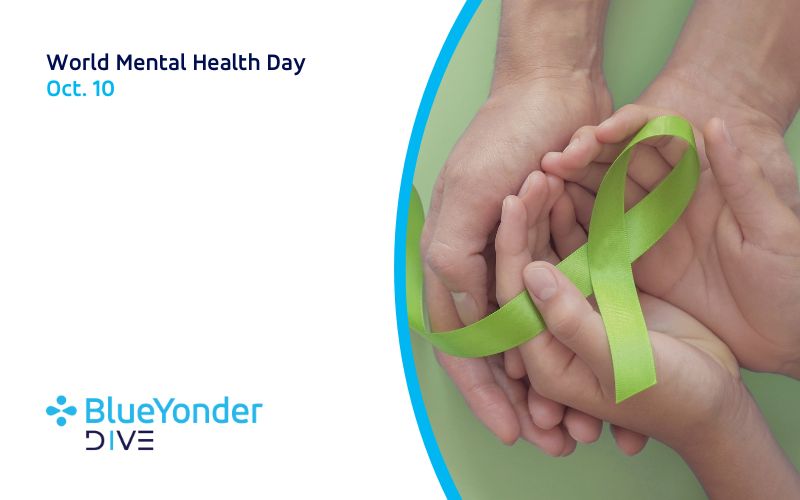Blue Yonder Associate Shares His Story in Honor of World Mental Health Day
World Mental Health Day is celebrated every year on October 10 and is an opportunity to raise awareness about the importance of mental health. This year’s theme is “It’s Time to Prioritize Mental Health in the Workplace.” In this DIVE In blog, Blue Yonder associate and Time to Talk representative Claudia Kraft interviews a fellow Blue Yonder associate about how his experiences have led him to discover why prioritizing one’s mental health is essential.
How has your view of mental health changed over the years? Has your personal journey/experiences impacted this view?
The primary change for me is that mental health is now integral to the way I assess and plan my life. This has evolved dramatically over the years.
I graduated from the Naval Academy and became an officer in the Marine Corps. I’ve been through all the training. I was deployed to a war zone. We were immersed in a culture of mental toughness and stamina. We learned to make decisions under duress. That was the job.
- We were trained for it
- We knew how to react
- We knew we could count on our team
For most of my career, that mindset served me well. But there have been seismic shifts in the landscape over the last few years. The remote working environment, dramatic evolution of technology solutions and rising work expectations have all made things more challenging. I started having panic attacks and had to step away from a project to protect myself.
My mental state went from being one of the primary assets that enabled me to succeed at my job to this all-consuming, swirling sphere of existence that was threatening me, making me question how long I could live like this. Something had to change, or I was going to compromise everything I had worked for over the years.
In terms of self-care and mental health, are there routines (exercise, sleep, meditation, Headspace, anything else) you have found helpful?
I had to get out of crisis mode. I ended up in the emergency room with chest pains and an unrelenting panic cycle that lasted three days. Three days without sleep with a pounding heart and feeling terrified of something.
My doctor helped by prescribing medication to quiet my mind and break the overthinking/crisis cycles. Then I leaned into the services and benefits available through Blue Yonder:
- I reached out to find a therapist, just to have someone to talk to. If you are feeling isolated, their voice can be your lifeline to pull you out of a hole. It is also better to offload my problems to a trained therapist instead of my wife, as her role is not to cure me.
- I also started using Headspace meditations and other tools daily. Just 15 minutes a day of guided mediation helps me calm my mind and find a quiet place where I can feel more in control and grounded in the present moment.
I have purposefully spent more time doing outdoor activities. I recognized that I compromised my hobbies to address my workload and high peaks of work assignments or travel schedules. This also contributed to my situation as I was not able to wind down. I’m an avid kayaker and getting back on the water and into nature has been a great way to relax and calm down.
I’m still struggling with sleeping and other aspects that have changed, but I’m working on it!
As a leader at Blue Yonder, what behaviors do you think are important for leaders to model around boundaries and mental health?
As a leader, our primary contribution to our associates’ mental health is to care, ask questions and listen. Have the courage to talk about these topics. Leaders serve, support and enable. They make the time to:
- Care for their people
- Listen to them
- Respect and encourage work-life balance
What is one piece of advice you personally found helpful and want to share with others?
Listen to your body and soul—pay attention to the signs. You are not immune.
Share your emotions and feelings with others. Don’t pretend that ‘everything is fine’ and try to mask your real feelings. You don’t need to ‘tough it out’ and it is certainly not weakness to care and feel these challenging, unsettling and often terrifying feelings. If you can open up yourself, then you allow room for others to support you. Even speaking up or sharing the situation is a starting point for reducing stress and anxiety. Since I’ve been doing this, I recognized that I’m not the only person who is facing such challenges. I can lead by example that opening up helps. Lastly, I’d like to thank my wife and manager for the support they have provided. Additionally, I’d like to recognize every medical person I’ve encountered. They have reacted with compassion and heart-felt empathy.

